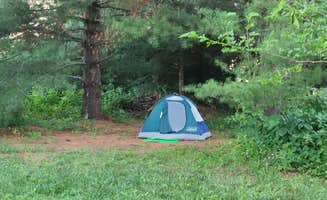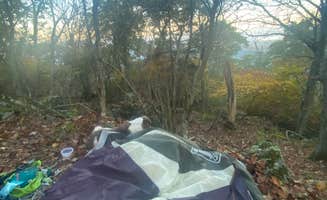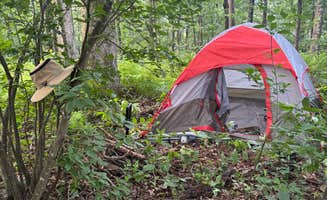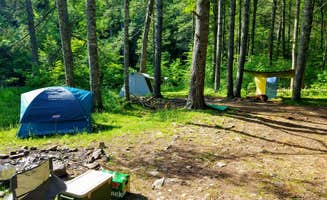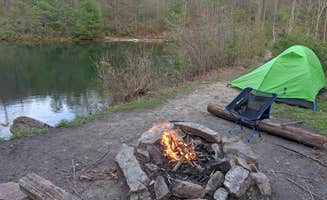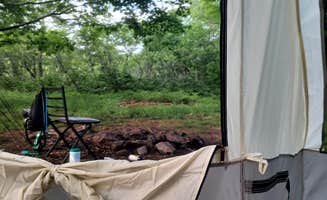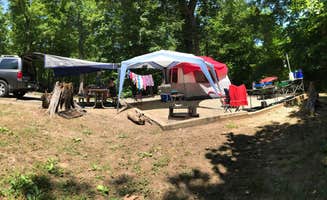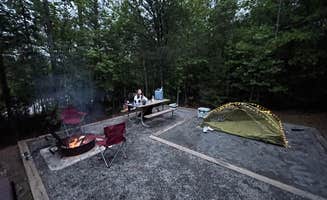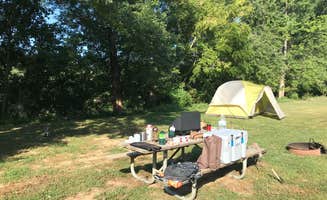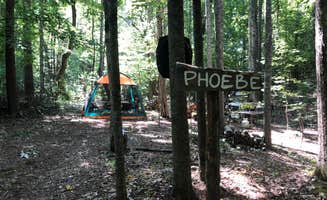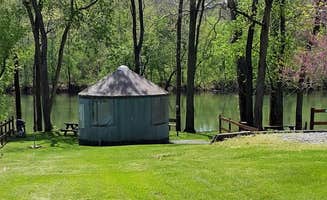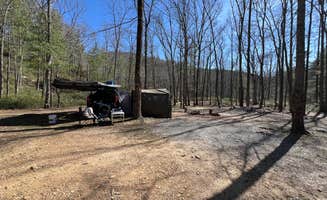Camping in the Crimora area occurs at 1,200-1,800 feet elevation in Virginia's Shenandoah Valley, nestled between Shenandoah National Park and George Washington National Forest. The region experiences moderate rainfall averaging 40 inches annually with summer temperatures typically reaching 85°F during day and dropping to 60°F at night. Winter camping requires preparation for temperatures that can drop below freezing.
What to do
**Mushroom exploration: At Hawk Nest Mushroom Farm, visitors get educational tours of mushroom cultivation areas. "We got a nice tour of the mushrooms currently growing at the farm," notes Ralph P., who appreciated the "unique campsite setup not too far from the house/mushroom farm area."
**Paddling access: Canoe Landing Group Campsite offers river access for paddling adventures. "Camping along the river at the Canoe Landing Campground is great in the slower seasons," reports Christina, adding "you can fish right off the bank less than 50 yards from your tent."
**Night sky viewing: The Crimora region offers excellent stargazing opportunities with minimal light pollution. One camper at Branch Pond shared their experience: "I enjoyed my visit AND LOVED THE DARK SKY FOR STARGAZING!"
What campers like
**Cedar tree canopies: The shaded camping areas at Hawk Nest feature distinctive tree coverage. "The camp area sits under a canopy of cedar trees," reports Ralph P., creating natural temperature regulation during summer months.
**Privacy between sites: Many campgrounds in the area offer good separation between campsites. At Walnut Grove, a reviewer mentioned "Given that there are only 20 sites you don't get a feeling of crowded. Multiple empty sites during the week."
**Wildlife viewing: The diverse ecosystem around Crimora supports various wildlife. As Emil D. discovered at Switzer Lake: "We have encountered a bear at or around the campsite 3 times," highlighting the importance of proper food storage.
What you should know
**Road conditions: Access to some of the best tent camping near Crimora, Virginia requires preparation for rough roads. At Switzer Lake Dispersed Camping, Lauren M. advises: "I drove past the lakefront sites and there are a few really nice spots right past the paved bridge on the dirt road... I drove down a path that would not be accessible with a car."
**Seasonal site differences: Sites can change dramatically between seasons. "The road is a mix of gravel but also dirt so it can become muddy during rain," notes Emil D. about Switzer Lake, adding "If you follow the road, there is a river crossing that will take you to additional camp spots."
**Pack-in requirements: Many primitive sites require carrying in all supplies. At Emerald Pond Primitive Campground, Jon N. explains: "One of the spots could hold about 4 tents, so, great for some friends going out together. There are also fire rings at these tent spots, and plenty of trees to collect wood in the area."
Tips for camping with families
**Wheelchair-accessible transfers: For families with mobility concerns, research specific site access. "There are wheelbarrows available for use," notes a camper at Canoe Landing Group Campsite, though they caution "navigating a wheelbarrow full of camping gear down a hill with stairs isn't easy."
**Kid-friendly nature programs: Some parks offer educational opportunities. One visitor mentioned: "My 4 yr old spent hours playing with all the little animals the ranger station had."
**Swimming safety: River and lake swimming requires supervision. A camper at Canoe Landing advises: "We only stopped here for an afternoon, but it was a very cool park with access to swim in the James River. The water seemed clear and cool on a Summer day and we had fun fighting the current. Note though—would be careful swimming with children."
Tips from RVers
**Site surface considerations: Most primitive tent camping around Crimora has unprepared surfaces. At Emerald Pond Primitive Campground, a camper notes: "Once you do get to the pond, there are several cleared spots to put up a tent," which requires tent stakes that work in various soil types.
**Temperature fluctuations: The valley location creates unique microclimates. "I didn't expect temps to get as low as they did the night I went out there, but keep in mind it is fresh (cold) spring water and you're in the middle of two ridge lines, so it will get colder than the surrounding areas," warns a visitor to Emerald Pond.
**Cell service limitations: Connectivity is unreliable in much of the region. Emil D. at Switzer Lake points out "there is no cellphone signal for any carrier from what I could tell," making offline navigation tools essential.


